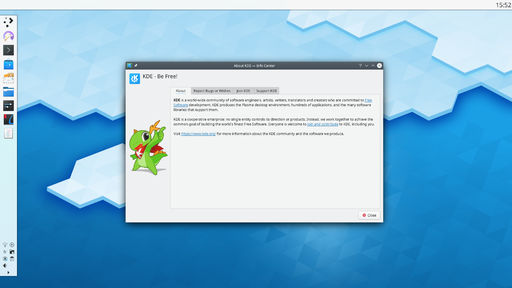Plasma/Paneller
Plasma Masaüstü'nde Paneller

Panel, masaüstünün herhangi bir yerine yerleştirilebilen bir gereç biriktiricisidir. Aynı bölümde birden fazla panel bulunabilir. Varsayılan panel, masaüstünün altını kaplayacak şekilde uzatılan ve aşağıdaki gereçleri içeren paneldir: uygulama menüsü, masaüstü sayfalayıcı, görev yöneticisi (açık pencerelerin listesi), sistem çekmecesi, aygıt bildiricisi ve saat. Eğer bir dizüstü bilgisayar, netbook veya pil kullanan diğer bilgisayarları kullanıyorsanız pil durumunu gösteren bir güç yönetimi gereci de panelde olacaktır. Panelin sonunda yapılandırma ayarlarına erişimi sağlayacak bir araç kutusu düğmesi bulunmaktadır.
Yapılandırma
Panel, ardından yatay panelin sağında veya dikey panelin aşağısında bulunan araç kutusu ile yapılandırılabilir. Bu durumda, panel yapılandırma kipinde olacaktır. Panel yapılandırmasına ayrıca panelde sağ tıklayarak bağlam ile de ulaşılabilir.

Paneldeki gereçler, yapılandırma modunda sürüklenerek sıralanabilir. Gereçler yatay panelde sola ve dikey panelde yukarı hizalanırlar.
Panel Araç Kutusu
- : Panelinizi ekranın dört bir yanına sürüklemenizi sağlar.
- (yatay panel için): Panelin yüksekliğini ayarlamanıza izin verir.
- (dikey paneller için): Panelin genişliğinin ayarlanmasına izin verir.
- : Gereçlerin panele eklenmesine izin verir.
- : Panele boşluk ekleyerek içerisindeki öğeler arasına boşluk koymanızı sağlar.
- Bir boşluğun standart davranışı, mümkün olduğunca boşluk kullanmakdır (esnek boyut). Bağlama menüsüne girin (sağ tıklayın) ve seçin.
"Daha Fazla Seçenek" Menüsü
- : Allows the alignment of the panel to be set in three pre-set positions.
-
- : Keeps the panel visible at all times, even when windows are maximised.
- : Hides the panel off screen until the mouse is placed near the screen edge.
- : This allows windows to cover the panel and if maximised, will cover the panel.
- : This allows windows to go below the panel, even when maximised.
- : Makes the panel fit to the screen edges, if it has been resized.
- : Locks the panel and widgets in position. Also hides the toolbox.
- : Removes the current panel and all widgets in it.
Under the Hood
Should anything "untoward" happen to your panel have a look at ~/.kde(4)/share/config/plasma-desktop-appletsrc - the panel itself is classed as a containment (there are at least two, the desktop and the panel) which is home to all the different widgets you put there.

Multiple Panels
It is also possible to have more than one panel on your desktop. This proves useful if you want to have a more flexible layout:

Adding a Panel
To add a new panel either click on the desktop toolbox button and select or open the context (right click) menu on the desktop and select from the menu.
If more than one kind of Panel is installed, you will be able to select between them to choose what sort of Panel you would prefer. By default, two Panel types are available: , which creates a Panel containing all of the default widgets (launcher, pager, tasks, system tray, clock, etc.), and , which adds an empty Panel without any pre-configured widgets in it.
Locking
The panels and desktop may be locked to prevent changes being made to them. When locked, the toolbox buttons will not be shown on either the desktop or on the panels. To configure a panel, it must be unlocked, otherwise the toolbox and context menu entries to configure or add widgets are unavailable.
Locking can be done by either selecting the entry in the Panel toolbox's menu or in the Panel context (right click) menu. Once locked, the Panels can be unlocked again by right clicking on either a panel or desktop and selecting from the menu that is displayed.
